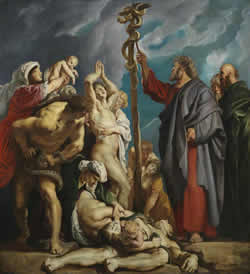Misconception #46 (Cont’d)
God Sent Serpents After the Children of Israel as They Wandered Through the Wilderness
How could a God so determined to rescue His people turn against them so abruptly? In retrospect, we can see He didn’t act so abruptly, after all, did He? With this new understanding in mind, let’s continue our review.
The Israelites journeyed from Mount Hor, by way of the Red Sea, which encompassed the land of Edom, and there the hearts of the people became very discouraged because of the difficulty of their journey. So the people began complaining about God and Moses, saying, “Is this why you’ve brought us out of Egypt, just to die in the wilderness? There’s no bread or water! And we hate this bread you call manna!”
So the Lord sent fiery serpents among the people, and they bit them; and many of them died as a result of these bites. Therefore, the people came to Moses, saying, “We’ve sinned, because we’ve spoken against the Lord, and against you; so pray to the Lord for us so He might remove the serpents from our midst.”
And Moses prayed for the people, and God said to Moses: “Make a fiery serpent, and set it on a pole, so that if anyone who was bitten will gaze at it, they’ll live.”
So Moses made a serpent of brass and placed it on a pole, and whenever someone was bitten by a serpent, he merely had to look at the brazen serpent, and they lived.1
Story Continues Below
Says Richard Price—the founder and CEO of Academia.edu—on his podcast In Depth With Academia:
Fish Tales (From the Belly of the Whale): Fifty of the Greatest Misconceptions Ever Blamed on The Bible is:
To hear Price’s book review of Fish Tales (From the Belly of the Whale), CLICK HERE.
To hear Kent and Zen Garcia talk about correcting biblical misconceptions, from September 9th, 2021, CLICK BELOW.
Story Continues From Above
What do we have so far? We have a series of events that depict a benevolent God Who went to great lengths to rescue a people who obviously have a hard time appreciating what He did for them. Even though He rescued them from centuries of slavery, ushered them through the parted Red Sea, destroyed Pharaoh’s pursuing army, and provided water and food at every point in their journey, they still had the nerve to put God on trial, as if He were their personal bellhop.
So what happened next? The Lord sent in the venomous snakes to get even with them, right?
Well, not exactly.
“What’s that you say?” you might ask. “You mean God didn’t send serpents after them? But isn’t that what The Bible says?”
To which I’d reply, “It does if you accept the King James translation as it stands. It does if you ignore the context in which these events are described.”
Let me take a moment to explain what I mean.
Once again, we have a passage in Scripture that falls short of its original intention due to a poor translation. In this case, the word used for “sent”—from the Hebrew word shalach—can just as easily be translated as “let loose” or “released.”
So picture this: Instead of portraying a vindictive God spewing out serpents every which way, the more accurate version of this story is one in which the Israelites were wandering through the desert where thousands of serpents were already lurking about. After all, they were traveling through a desert, right? It’d be ludicrous to think there wouldn’t be swarms of snakes lurking about, not to mention countless other venomous creatures just waiting to strike at a moment’s notice. Yet not once is there any record of these creatures attacking the Israelites prior to this time. We can only assume, if no one was harmed, it was because God had preserved them the same way He had throughout their journey from Egypt.
With this new view in mind, we start to see a different spin to this whole wilderness experience. Now we see that, when the Israelites managed to weary God with their lack of faith, He simply “let loose” or “released” the thing He’d previously been holding back in His mercy.
The same thing happens when a loving father protects his children from harm’s way until finally their persistent rebellion forces the father to allow them to discover the harsh realities of life he’d previously been protecting them from. In a case like that, no one would think that the father had blatantly struck out at his children. Why, then, would anyone think that God, the Father, would do what no earthly father would do?
So again, we ask: Why would we believe that a benevolent, loving God could be capable of such wanton acts of cruelty? The answer lies in the fact, as in previous cases, that centuries of tradition have caused most people to simply accept what the biblical translators—however well intentioned—have handed down to us. But consider some of the reasons why.








